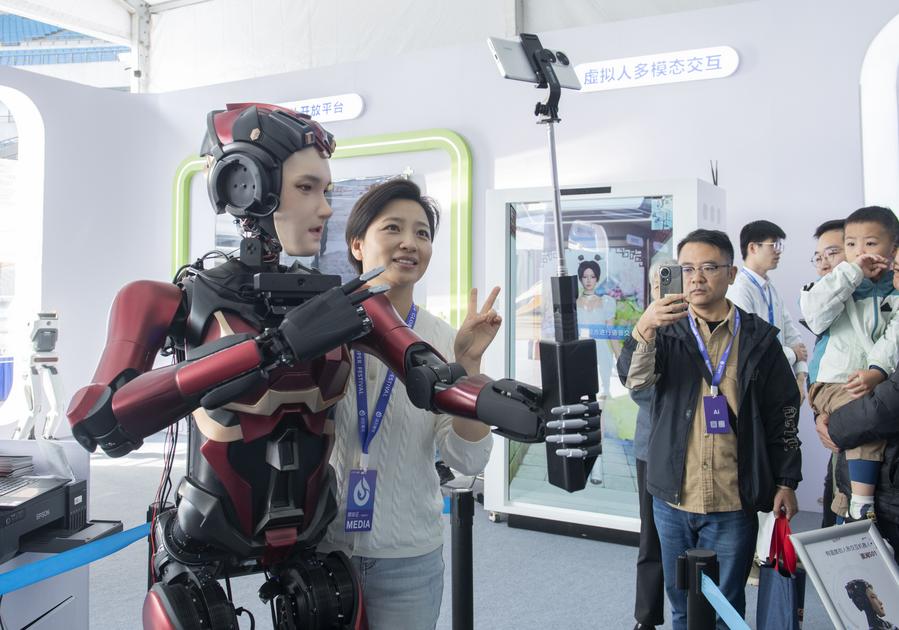Generative AI reshapes various industries in China
The user base of generative artificial intelligence (AI) products in China had reached 230 million by June 2024, according to a recent report on the development of generative AI issued by the China Internet Network Information Center (CNNIC).
As one of today's most dynamic fields of innovation in the world, AI continues to empower various industries, said Liu Yulin, director of the CNNIC, adding that generative AI products are gaining traction among Chinese internet users, significantly impacting their daily work and life.
For instance, when a woman surnamed Zhang needed to research the latest advancements in AI-driven healthcare, she turned to a generative AI application instead of sifting through countless sources manually. Within seconds, she received several of the latest academic case studies on intelligent diagnostics, telemedicine, and patient management, along with brief analyses highlighting key innovations, implementation effects, and potential impacts on the medical industry.

A humanoid robot takes selfies with a visitor at the 7th World Voice Expo in Hefei, east China's Anhui Province, Oct. 24, 2024. (Xinhua/Fu Tian)
Application scenarios of generative AI products like this have become increasingly common in China. By the end of 2024, 302 generative AI services had been registered in the country, offering users a diverse range of options and tailored experiences.
The report highlighted that China has built a relatively comprehensive AI industry ecosystem, with more than 4,500 related companies in the industry and the value of the core sector approaching 600 billion yuan (about $82.38 billion). The AI industrial chain spans key areas both upstream and downstream, including chips, algorithms, data, platforms and applications.
Recognizing AI's strategic importance, China has in recent years issued a series of policy documents on AI and accelerated building a policy system for meeting the needs of high-quality development of the AI industry to advance technological progress, promote the development of enterprises, drive industrial upgrades, and ensure the sector's security, Liu said.
Across the transportation, energy, manufacturing, and chemical industries, high-tech firms have collaborated with traditional enterprises to develop specialized generative AI models, exploring how to utilize this emerging technology to empower the real economy.
As a pillar of China's economy, the industrial sector presents vast opportunities for AI integration, Liu said, adding that generative AI has made waves in research and development, design, and production, emerging as a key driver for new industrialization.
The continuous integration of generative AI with the real economy has accelerated the intelligent transformation of agriculture, manufacturing, and services sectors, Liu said.
About one-third of users use generative AI products as their work assistants, said the report. From voice assistants and autonomous vehicles to machine translation and intelligent healthcare solutions, AI models are entering people's daily life, enhancing users' quality of life and work efficiency.
The fusion of AI and traditional communication technologies will further accelerate digital transformation, form more application scenarios, and enhance the user experience, said Huang Chengqing, vice president of the Internet Society of China.
Beyond personal convenience, generative AI's data-processing power, content-generation capabilities, and automated decision-making functions are also making public services more efficient.
Generative AI can enable smarter urban management decisions, significantly improve the efficiency and response time of municipal services, thus optimizing the allocation of urban resources and comprehensively enhancing the quality of public services, according to an executive of the CNNIC.
Looking to the future, Huang said that from an internet governance perspective, the values of AI products should align with human societal values. This alignment is crucial for ensuring that while we benefit from AI, we also maintain network information security and user privacy.
Photos
Related Stories
- AI technology widely adopted during Spring Festival events
- Chinese AI companies ramp up recruitment as sector expands rapidly
- International cooperation only viable way to keep AI power under human control: Fu Ying
- China willing to promote AI development with other countries: Chinese Vice Premier
- China eyes global cooperation at AI summit in Paris: expert
- Global investors increasingly bullish on Chinese stocks after DeepSeek’s rise
- Chinese telecoms, brokerages and carmakers adopt DeepSeek’s AI model, showing rapid application
- Collaborative, innovative AI ecosystem highlighted
- China prioritizes AI, low-altitude transport standards for 2025
- China prioritizes AI, low-altitude transport standards for 2025
Copyright © 2025 People's Daily Online. All Rights Reserved.









